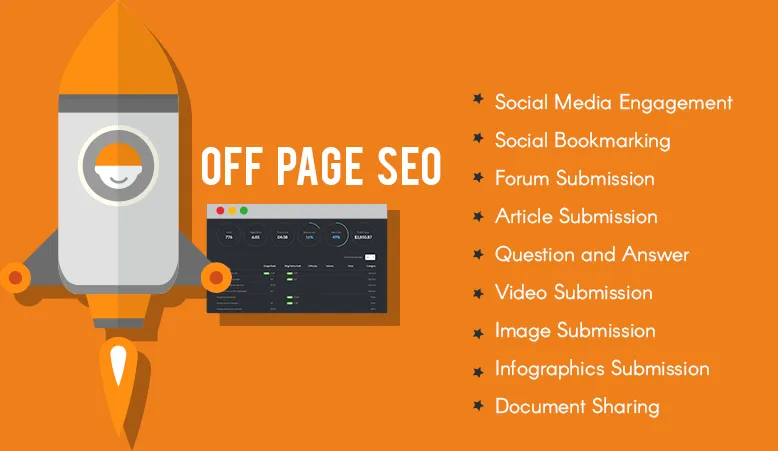Unraveling the Power of On-Page and Off-Page Optimization: Aligning Your Website with Targeted Keywords

In the fiercely competitive digital landscape, online visibility is essential for businesses striving to attract their target audience. Achieving a strong online presence requires strategic optimization techniques that resonate with search engines and users alike. Two crucial pillars of search engine optimization (SEO) are on-page optimization and off-page optimization. By employing these practices, webmasters and marketers can create a cohesive theme around their targeted keywords, driving organic traffic and enhancing their online success. In this blog, we delve into the significance of on-page and off-page optimization and how they contribute to a harmonious website theme.
Understanding On-Page Optimization
On-page optimization revolves around optimizing individual web pages to improve their search engine rankings and enhance user experience. It focuses on the content and structure of the website, ensuring that search engines can easily crawl and index the pages. The primary goal of on-page optimization is to make a web page relevant to specific targeted keywords, helping it rank higher in search engine results.
Key On-Page Optimization Techniques:
- Keyword Research: Thorough keyword research is the foundation of on-page optimization. By identifying the most relevant and high-performing keywords in your niche, you can align your content with what your audience is actively searching for.
- Meta Tags and Titles: Crafting compelling meta tags and title tags that incorporate your targeted keywords provides search engines with vital information about your page’s content.
- High-Quality Content: Creating valuable and informative content that revolves around your targeted keywords not only pleases search engines but also engages and retains visitors.
- URL Structure: Designing user-friendly URLs that include keywords can enhance the page’s visibility and improve the overall website navigation.
- Optimized Images and Alt Tags: Using descriptive alt tags for images allows search engines to understand their context, contributing to better rankings.
- Internal Linking: Strategically linking relevant pages within your website helps search engines and users navigate through your content more effectively.
The Significance of Off-Page Optimization
While on-page optimization focuses on the website itself, off-page optimization deals with external factors that influence a website’s reputation and authority. This practice involves establishing a robust online presence through various means, ultimately building credibility and visibility.
Key Off-Page Optimization Techniques:
- Link Building: Acquiring high-quality backlinks from reputable websites signals search engines that your content is valuable and trustworthy.
- Social Media Marketing: Engaging in social media platforms not only increases your website’s exposure but also fosters a community around your brand.
- Guest Blogging: Contributing valuable content to authoritative websites in your industry can boost your website’s reputation and attract more visitors.
- Online Reviews and Citations: Positive reviews and local citations contribute to a positive online reputation, which can improve your search engine rankings.
- Influencer Marketing: Collaborating with influencers and industry leaders can expand your reach and attract a relevant audience.
The Power of a Consistent Theme
By aligning on-page and off-page optimization with targeted keywords, you create a consistent and coherent theme throughout your website. This not only helps search engines understand your website’s purpose but also provides users with a seamless experience. A consistent theme reinforces your brand identity, establishes trust with your audience, and encourages visitors to explore more of your content.
Conclusion
In the world of SEO, on-page and off-page optimization work in harmony to create a cohesive and powerful online presence. By conducting comprehensive keyword research and optimizing on-page elements, you ensure that your website content is relevant and appealing to both users and search engines. Simultaneously, off-page optimization techniques build authority, credibility, and visibility, strengthening your website’s reputation in the digital realm. When these two practices align with your targeted keywords, they generate a theme that resonates with your audience, leading to increased organic traffic, higher search engine rankings, and long-term online success.
Faqs:
What is the difference between on-page and off-page optimization?
On-page optimization involves optimizing individual web pages, focusing on content, meta tags, URL structure, and internal linking. It aims to make a web page relevant to targeted keywords and enhance user experience. Off-page optimization, on the other hand, deals with external factors like link building, social media marketing, guest blogging, and online reviews. It focuses on building a website’s reputation and authority across the internet.
How does on-page optimization contribute to search engine rankings?
On-page optimization helps search engines understand the content and relevance of a web page. By incorporating targeted keywords into meta tags, titles, and content, search engines can index the page accurately. High-quality content and user-friendly URLs further improve the page’s ranking potential.
Why is keyword research crucial for on-page optimization?
Keyword research lays the foundation for on-page optimization. By identifying relevant and high-performing keywords, webmasters can tailor their content to match what their target audience is searching for. This drives organic traffic and improves search engine rankings.
What role does link building play in off-page optimization?
Link building is a critical aspect of off-page optimization. Acquiring quality backlinks from authoritative websites signals to search engines that your content is valuable and trustworthy. This, in turn, can positively impact your website’s reputation and authority, leading to higher search engine rankings.
How does social media marketing benefit off-page optimization?
Social media marketing expands your website’s online presence and fosters a community around your brand. Engaging with your audience on social media platforms increases exposure, drives traffic, and enhances your website’s credibility.
Is off-page optimization necessary for SEO success?
Yes, off-page optimization is essential for SEO success. While on-page optimization ensures that your website is relevant and user-friendly, off-page optimization builds authority and reputation in the eyes of search engines. Both practices work together to establish a strong online presence and improve search engine rankings.
How does a consistent theme benefit my website?
A consistent theme, achieved through aligning on-page and off-page optimization with targeted keywords, provides a clear message to search engines about your website’s purpose and content. It also enhances user experience, strengthens brand identity, and encourages visitors to explore more of your content.
Can I handle on-page and off-page optimization myself, or should I seek professional help?
Both on-page and off-page optimization require a certain level of expertise and continuous monitoring. While some aspects can be managed by website owners, seeking professional help from experienced SEO specialists can lead to more effective and comprehensive optimization strategies.
How long does it take to see results from on-page and off-page optimization efforts?
The time to see results may vary depending on the competitiveness of your niche, the quality of your optimization efforts, and the algorithms of search engines. Generally, significant improvements in rankings and organic traffic may take a few weeks to months.
Is website optimization a one-time process, or does it require ongoing efforts?
Website optimization is an ongoing process. The digital landscape is constantly evolving, and search engine algorithms frequently change. Regularly updating and improving your on-page and off-page optimization ensures your website remains competitive and relevant in the ever-changing SEO environment.




